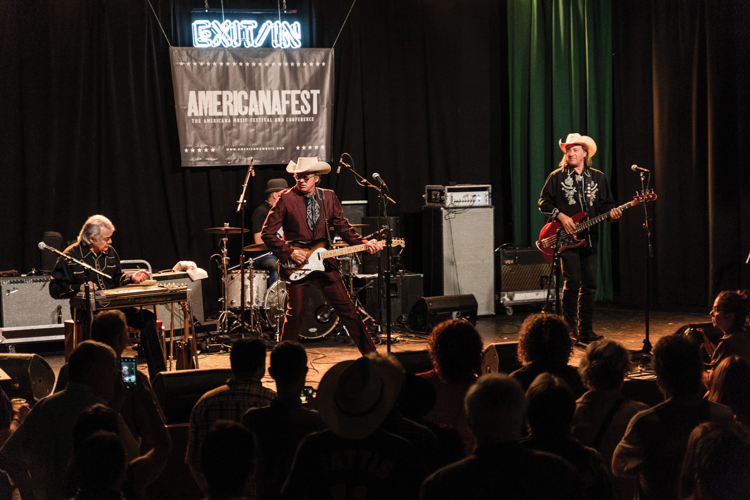
Chuck Mead at Exit/In during AmericanaFest, 9/13/2019
The live music scene in Music City offers a huge array of options these days. That cool band you saw on The Late Show, or that astonishing rapper at SXSW? Whether or not they live here, the likelihood is pretty good that they’ll play here before too long. That’s not something you could say a decade ago.
In a Scene cover story nearly half a decade ago, D. Patrick Rodgers and Adam Gold looked at where a lot of the movement and growth in the scene was happening and continues to happen: at the club level. Venues that accommodate 200 to 1,500 people are where rising artists do the audience-building that’s critical to solidifying their careers. Big players have taken notice of Nashville’s strength in this sector, made possible by the efforts of local concert promoters, talent buyers, venue management and audiences (including the thousands of people who’ve moved here). And that could potentially have a big effect on what we’ll see in 2020 and beyond.
Rodgers and Gold noted the influence of Live Nation, the world’s largest ticketing and concert promotions company. The Beverly Hills-based firm handles programming at three of Nashville’s biggest venues: Bridgestone Arena, Municipal Auditorium and Ascend Amphitheater. One thing Live Nation couldn’t really do back in 2014 was offer the cool factor of much-loved local venues. But in 2019, the company made some inroads there.
In October, Live Nation inked an exclusive booking deal with The Basement East, an East Nashville club with a capacity of around 500. In December, word went out that Brooklyn Bowl Nashville — a 1,200-cap club near First Tennessee Park, and a joint venture between Live Nation and the founders of the successful New York venue/bowling alley franchise — will open in March.

Future home of Brooklyn Bowl Nashville on Third Avenue North near First Tennessee Park
This means Live Nation is effectively in direct competition with Exit/In and Mercy Lounge at the 500-capacity level, and with Cannery Ballroom and Marathon Music Works in the 1,000-plus range — all four are locally owned venues that are totally independent. (Mike Grimes and Dave Brown still own The Basement East and their longstanding original club, The Basement.) Artists who work with Live Nation, in order to get access to the company’s vast resources and international promotion and booking capabilities, are almost certainly going to be appearing in clubs where the massive firm has extensive or exclusive control.
This situation poses additional challenges for the locals, who are already up against some serious concerns related to real estate.
The Rock Block, the strip of Elliston Place home to Exit/In and its smaller neighbor The End, was placed at the top of Historic Nashville Inc.’s Nashville Nine list of endangered properties for 2019. While nearby hotel construction that’s still in the planning stages wouldn’t affect either venue directly, area business owners like Exit/In’s Chris Cobb have been vocal about potential harm to their businesses from changes in the character of the neighborhood.
Meanwhile, Cannery Row — the property housing Cannery Ballroom and Mercy Lounge (as well as smaller venues The High Watt and ONE) — sold to New York real estate firm Thor Equities Group in 2019 for $32 million. While the Cannery clubs are supposed to remain in operation, the new owners have said they plan to add 500,000 square feet of mixed-use development on the property. Even if construction is restricted to the parking lot adjacent to the venues along 10th Avenue South, condo residents have at times proven not to be fans of nearby live music — complaints in 2016 and 2017 effectively quashed loud concerts in Midtown and at venues near the Demonbreun Street roundabout.
How this all plays out is anyone’s guess. But one thing’s certain: It would be a shame to lose what we’ve been building for so many years.





